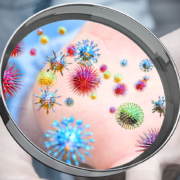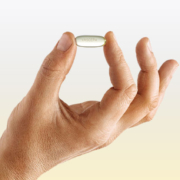Dr. Chet’s Health Memos
 If it’s in the health news today, I’ll be writing about it as soon as I read the research, both old and new. With my email Health Memos, you’ll know more about making lifestyle choices that will help you get and keep good health. These free, concise updates on health are emailed to subscribers twice a week. Subscribe today and get a free MP3, in English or Spanish, of Dr. Chet’s Top Ten Tips—Small Changes for a Healthier Life.
If it’s in the health news today, I’ll be writing about it as soon as I read the research, both old and new. With my email Health Memos, you’ll know more about making lifestyle choices that will help you get and keep good health. These free, concise updates on health are emailed to subscribers twice a week. Subscribe today and get a free MP3, in English or Spanish, of Dr. Chet’s Top Ten Tips—Small Changes for a Healthier Life.
Do Dogs Need Vitamins?
I recently got a question from a long-time listener who asked if it was okay to give the dog a partial serving of their multivitamin-multimineral. I didn’t have a clue—I don’t deal with supplements and animals, with the exception of glucosamine and fish oil. Both are good for dogs, but what about the rest of […]
The Skin Microbiome: Skincare and Cosmetics
While the state of the current pandemic has restricted the ability to socialize to any great degree, it may turn out to be beneficial for the skin microbiome. Be honest. If you don’t have to go to work or out into the public, do you still maintain the same personal grooming practices? Do you put […]
The Skin Microbiome: pH
The water we shower and bathe in may impact our skin microbiome, but we don’t generally just rinse off with water. We use soaps and shampoos as well. How could they impact the microbiome of the skin? Let’s take a look. Normal healthy skin has a pH range of 5.4 to 5.9. At that pH, […]
The Skin Microbiome: Birth and Water
I began last week’s focus on the skin microbiome based on reading an interview with a scientist who hasn’t taken a shower in over five years (Clean by James Hamblin). We’ve established the basics about skin and the microbes that are supposed to reside in the skin microbiome. This week we’ll cover how the skin […]
The Skin Microbes: What They Eat
When we talk about the microbiome of the digestive system, it’s well-known what they eat: sugar. That’s also mostly true for the skin’s microbiome, although those microbes eat other substances as well. In today’s Memo, we’ll cover the types of bacteria and where they’re located. Then we’ll look at their diet. The Microbes of the […]
The Skin Microbiome: Anatomy
The skin microbiome is amazingly complex. Not only do we have all the beneficial bacteria and other microbes, we also have microbes that can be beneficial or damaging depending on how we treat the skin. Let’s begin with location: where are all these microbes located? For that, we need to understand a little bit about […]
No More Showers!
If you saw a book called Clean, you probably wouldn’t think the author decided not to take any more showers. But you would be wrong, because that’s exactly what Dr. James Hamblin announced he would do about five years ago in a magazine article. Over time and a whole lot of research, the article became […]
Research Update on Fish Oil Supplements
Researchers performed a meta-analysis of studies that examined EPA and DHA as dietary supplements to see if there was a reduction in CVD events and mortality. In this study, researchers included 40 studies with 135,267 participants. While they examined many different variables, including whether EPA was better than DHA and whether they could find the […]
Research Update on Prescription Fish Oil
Let’s begin by taking a look at the prescription fish oil supplement medication. To review, this is a 100%-EPA fish oil that received FDA approval in December of 2019. The amount prescribed for people with high triglycerides is four grams of highly processed fish oil per day. Data from the REDUCE-IT trial suggested that there […]
Research Update: Fish Oil and Heart Disease
The prescription fish oil Vascepa has been approved since December of last year. The fish oil medication was originally intended for those who had a family history of high triglycerides of 500 mg/dl or greater. In the approval process, the recommendation was lowered to those whose triglycerides were at least 150 mg/dl and who were […]





 SkinMicrobiome
SkinMicrobiome



